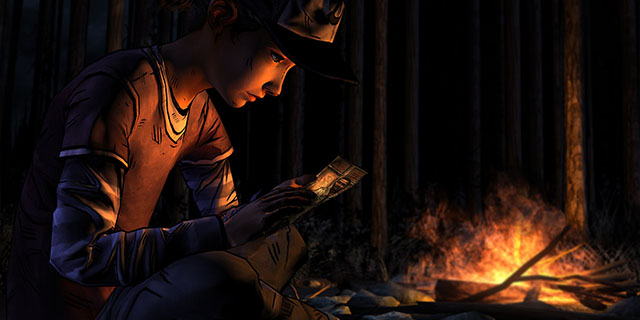
Editor’s note: The following contains spoilers for the second season of Telltale’s The Walking Dead.
Telltale’s The Walking Dead was my top game of 2012, so my expectations for the sequel were about as high as they could be. After finishing it and letting the impact settle, I can safely say it met every expectation I knew I had and surpassed expectations I didn’t know existed. This will land a spot in my top ten at year’s end for many of the same reasons its predecessor did: top-notch directing, excellent pacing, professional voice acting and brutal choices that force your inner moral compass to show itself, one way or another. The Walking Dead: Season Two retains much of what made the first game successful, but deviates so far from the story arc of Season One that it becomes a totally different experience and is richer for it.
I was anxious to hear Telltale was working on a sequel so quickly after the first one had released. I feared the product would grow stale, particularly if Telltale released yearly editions. All the refreshing trademarks might get repetitive in the wrong hands and create a tainted legacy. These reservations were put to bed quickly in Season Two. It is very clear that it takes an entirely different tone from Season One.
The first thing I noticed was the mood of everybody I ran into. In Season One, the onset of zombies was new, so there were a lot of questions. What caused it? What was the government doing to fix it? What should we do? So much uncertainty led to Season One’s grand question: how would people react at the onset of this catastrophe? Some are angry and some are scared, but there’s a (dwindling, admittedly) sense of hope. Much of that comes from the player’s role in Lee. Your main task is to protect Clementine, a resourceful and brave little girl. She represents potential, not only for Lee’s internal redemption, but for humanity. If she survives, others can survive and grow and learn more about the threat and return the world to how it used to be. You’re happy to meet new people, shocked when they betray you and grateful when they save your life.
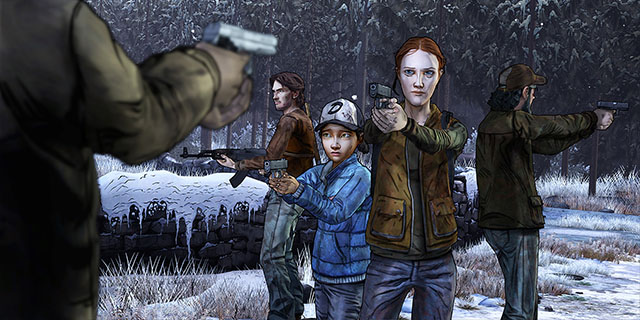
The Walking Dead: Season Two’s population is far more mistrustful. There are fewer “happy” moments. Everybody has resigned themselves to this being their lives now: surrounded by horrors, always on the hunt for their most basic needs and never trusting the person sleeping next to them. There’s no talk of government, saving the human race or how the hell this happened. Every new person could be an enemy as much as an ally. Playing the role of Clementine herself (nearly two years older) completely changes the dynamic. You’re only protecting yourself, but the residual charm from the first season sticks with you. It’s an immediate connection, and every choice I found myself making as Clementine had me often reaffirming my own decision, justifying that this was my Clementine. My Clementine was smart. My Clementine was kind, brave and selfless, and I grew very proud of her. She would never abandon a friend; she would always try to diffuse tense situations and try to keep the group intact. The world of The Walking Dead rarely allows you to make any of these decisions cleanly.
The choices themselves are not carbon copies of the first game, something I was very happy to see. It’s less “save Bob or let Bob die,” and more confounding. Do I steal these medical supplies? Do I offer food to this dog? Do I… I’m still processing the game’s final decision. It is critical, determining which ending you see. It is masterful in its execution, unforgiving to your emotions and builds upon nearly 13 hours of gameplay and story. I still feel guilty about my decision.
It started in Episode Two, in which it was revealed that Kenny, one of the most polarizing, emotional characters from Season One, was alive. In a superb storytelling moment, the game gives you the option to [HUG KENNY] and there can’t be more than a handful of players who didn’t pick this option. You so rarely get to have any kind of meaningful reunion in this universe, of course I’m going to hug him. I missed him. I’m so glad he was alive. Clementine was overjoyed to see him, which meant I was overjoyed to see him. It was such a beautiful moment, highlighted by the theme from the first game. The scene doesn’t last long, but the powerful connection from my previous Walking Dead experience made it so impactful I had to take a respite and collect my emotions.
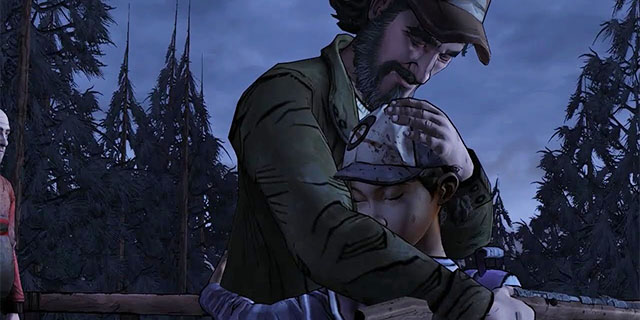
As much I want to feel secure, I know the strengths of the game lie in forcing me to make impossibly difficult choices, throwing me well outside my comfort zone. Kenny is not doing so well. He’s only a few years removed from losing his son and former wife. He reconnects with another woman but, as it so often does in these games, that relationship ends abruptly and Kenny starts to lose it. You can see it in the expressive cel-shaded animation; you can hear it in his voice that his inner rage is finding holes in his defenses and is willing to take him places you don’t want him to go. He becomes incessantly argumentative and, unlike in Season One, Lee isn’t there to calm him down. Part of Season Two’s most compelling style is forcing Clementine to make her own reasoning instead of listening to one particular adult.
But… I can’t go against Kenny. Can I? I’ve known him for years. We’ve survived hell together. I know what he’s gone through; how would you feel if you had everything taken away from you? Everything you’ve ever owned, every piece of family you can think of. Gone, brutally gone. The slow burn erupts in Episode Five, easily the best in the game. You’re finally left with Kenny, a tough-as-nails woman named Jane and little baby AJ. They start arguing in the car about where they should go. They’ve been arguing as soon as they met, and there hasn’t been any opportunity to try and talk sense to them. They’re swearing at each other, each trying to get you to side with them. Clementine, Kenny’s out of control. C’mon Clem, you’re going to trust this woman you barely know?
It’s cringe-worthy, in the best way. They both made good points. Am I loyal? Am I cold? Whether I want to survive is obvious, but how do I want Clementine to survive? I can’t trust Kenny; look at how angry he is. He’s murderous; he showed me that when he beat Carver’s face in to the bone. But what about Jane? She’ll leave on a moment’s notice and seemingly only cares about herself. She could be dangerous. Then there are the walking dead, the near-starvation and the constant daily grind of survival. There couldn’t be a better backdrop for the game’s final decision.
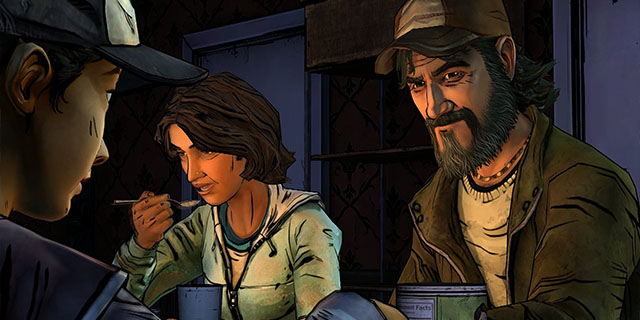
You’re temporarily separated in a snowstorm but reunite at rest stop. You and Kenny don’t see Jane and the baby… oh my god, baby AJ. What happened to him? Jane approaches… without him. I know this is going to drive Kenny insane; he made a pledge to me that he would raise AJ as a surrogate father and was instantly connected to his him. He misses his boy, and this is the chance for a fresh start. His mistrust of Jane, who claims she accidentally lost AJ, means they’re going to fight. Right now.
I tried to stop them. I yelled at them and got between them. I was desperate to see them both live through this, but you know where this is going, don’t you? I did, but it didn’t make it any easier. Kenny is about to stab Jane with a knife and you’re given the option to shoot Kenny or look away and let him kill Jane. What an awful situation. What’s even worse is I knew I was going to kill Kenny the second the decision tree popped up. But I hated myself for doing it.
In a heart-wrenching scene (how many more can I take?), Kenny tells Clem that she did the right thing. Oh no, Kenny, don’t say that. I tell him he’ll see his wife and daughter again. He says he’s scared of dying. I hold his hand.
But I had no choice. Right? I hear a baby crying and I immediately know what happened and my jaw drops. Jane pretended to lose the baby to show me Kenny’s true colors. Baby AJ is fine, but I am not. I hate Jane for taking Kenny away from me, though I’m fully aware that it was probably the right decision. I make Clementine forgive her, but I don’t know if I ever can.
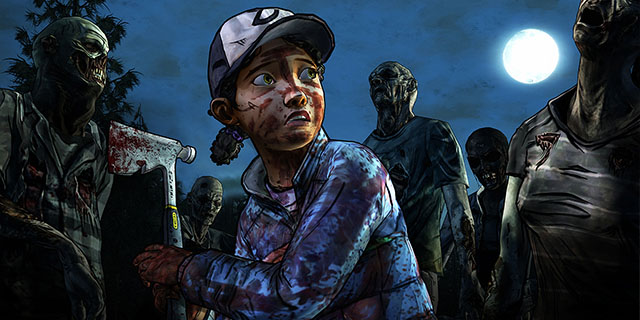
The game ends shortly after and I took to the forums to see what decisions everybody had made. What I found out made me feel even more remorseful about killing my friend. The ending where you go with Kenny instead of Jane leads to his final redemption, one I robbed of him in my playthrough. You finally reach Wellington, a town that you hear is safe and protected from the zombies. They claim they’re overpopulated and can only take the two children. Kenny gives you his hat for AJ when he grows up. He tearfully bids us farewell and wishes us to lead a good life. It tore at my heartstrings, for the quality of the scene, but also because I didn’t pick this ending. I still feel guilty, now even more so. I denied Kenny a chance to say goodbye, and to make things right. Kenny! A mainstay for more than 20 hours of gameplay spanning years of friendship. What have I done?
Should I go back and pick the different choice? I’ve decided not to. That would be a cop out, denying the game’s ultimate goal of emotional connection. Clementine and I will have to live with our decision. Kenny is gone, by our own hands.
We’re prisoners one moment and hunters the next; the game’s narrative is tight the whole way through. I couldn’t help but think the visuals received an upgrade and the more winter-themed wooded areas were a nice change of pace from Season One’s largely urban sprawls. There’s no lack of shocking moments, creative scenarios and gruesome deaths, but it’s the game’s final decision and subsequent endings that pulled me apart.



















